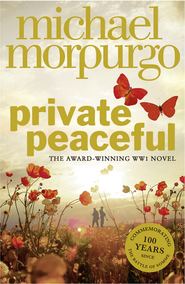По всем вопросам обращайтесь на: info@litportal.ru
(©) 2003-2024.
✖
Times of War Collection
Настройки чтения
Размер шрифта
Высота строк
Поля
I dreaded those steps then and I hated them again now. The slit windows let in only occasional light. The walls were slimy about me, and the stairs uneven and slippery. The cold and the damp and the dark closed in on me and chilled me as I felt my way onwards and upwards. As I passed the silent hanging bells I hoped with all my heart that one of them would be ringing soon. Ninety-five steps I knew there were. With every step I was longing to reach the top, to breathe the bright air again, longing to find Big Joe.
The door to the tower was stiff and would not open. I pushed it hard, too hard, and it flew open, the wind catching it suddenly. I stepped out into the welcome warmth of day, dazzled by the light. At first glance I could see nothing. But then there he was. Big Joe was lying curled up under the shade of the parapet. He seemed fast asleep, his thumb in his mouth as usual. I didn’t want to wake him too suddenly. When I touched his hand he did not wake. When I shook him gently by the shoulder he did not move. He was cold to my touch, and pale, deathly pale. I couldn’t tell if he was breathing or not, and Charlie was calling up at me from below. I shook him again, hard this time, and screamed at him in my fear and panic. “Wake up, Joe. For God’s sake, wake up!” I knew then that he wouldn’t, that he’d come up here to die. He knew you had to die to go to Heaven, and Heaven was where he wanted to be, to be with Bertha again, with Father too.
When he stirred a moment later, I could hardly believe it. He opened his eyes. He smiled. “Ha, Tommo,” he said. “Ungwee. Ungwee.” They were the most beautiful words I’d ever heard. I sprang to my feet and leaned out over the parapet. Charlie was down there on the church path looking up at me.
“We’ve found him, Charlie,” I called down. “We’ve got him. He’s up here. He’s all right.”
Charlie punched the air and yahooed again and again. He yahooed even louder when he saw Big Joe standing beside me and waving. “Charie!” he cried. “Charie!”
Charlie hopped and limped into the church, and only moments later the great tenor bell rang out over the village, scattering the roosting pigeons from the tower, and sending them wheeling out over the houses, over the fields. Like the pigeons, Big Joe and I were shocked at the violence of the sound. It blasted our ears, sent a tremor through the tower that we felt through the soles of our feet. Alarmed at all this thunderous clanging, Big Joe looked suddenly anxious, his hands clapped over his ears. But when he saw me laughing, he did the same. Then he hugged me, hugged me so right I thought he was squeezing me half to death. And when he began singing his Oranges and Lemons, I joined in, crying and singing at the same time.
I wanted him to come down with me, but Big Joe wanted to stay. He wanted to wave at everyone from the parapet. People were coming from all over: Mr Munnings, Miss McAllister and all the children were streaming out through the school yard and up towards the church. We saw the Colonel, coming down the road in his car, and could just make out the Wolfwoman’s bonnet beside him. Best of all we saw Mother and Molly on bicycles racing up the hill, waving at us. Still Charlie rang the bell and I could hear him yahooing down below between each dong, and imagined him hanging on to the rope and riding with it up in the air. Still Big Joe sang his song. And the swifts soared and swooped and screamed all around us, in the sheer joy of being alive, and celebrating, it seemed to me, that Big Joe was alive too.
TWENTY-EIGHT MINUTES PAST ONE (#ulink_d0cf0bb2-3ecf-54b2-812b-ca7134c2e099)
I was once told in Sunday school that a church tower reaches up skywards because it is a promise of Heaven. Church towers are different in France. It was the first thing I noticed when I came here, when I changed my world of home for my world of war. In comparison the church towers at home seem almost squat, hiding themselves away in the folds of the fields. Here there are no folds in the fields, only wide open plains, scarcely a hill in sight. And instead of church towers they have spires that thrust themselves skywards like a child putting his hand up in class, longing to be noticed. But God, if there is one, notices nothing here. He has long since abandoned this place and all of us who live in it. There are not many steeples left now. I have seen the one in Albert, hanging down like a broken promise.
Now I come to think of it, it was a broken promise that brought me here, to France, and now to this barn. The mouse is back again. That’s good.
There was a brief time just after we’d found Big Joe when all old hurts and grudges seemed suddenly to be forgiven and forgotten. Forgotten too was all talk of the war in France. No one spoke of anything that day except our search for Big Joe and its happy outcome. Even the Colonel and the Wolfwoman were celebrating with the rest of us up in The Duke. Molly’s mother and father were there too, celebrating with everyone else, and smiling — though being strict chapel people, they didn’t touch a drop of drink. I’d never seen Molly’s mother smile before that. And then the Colonel announced that he was paying for all the drinks. It wasn’t long — it only took a couple of pints — before Farmer Cox began singing. He was still singing when we left; some of the songs were getting a bit rude by then. I was there outside The Duke when Mother went up and thanked the Colonel for his help. He offered us all a lift home in his Rolls Royce! The Peacefuls in the back of the Colonel’s car, and the Wolfwoman in the front, being friendly! We couldn’t believe it, not after all the bad blood between us over the years.
The Colonel broke the spell on the way home, talking about the war, and how the army should be using more cavalry over in France.
“Horses and guns,” he said, “in that order. That’s how we beat the Boers in South Africa. That’s what they should be doing. If I were younger, I’d go myself. They’ll soon be needing every horse they can find, Mrs Peaceful, and every man, too. It’s not going at all well out there.”
Mother thanked him again as he helped us out of the car outside our gate. The Colonel touched his hat and smiled. “Don’t you go running off again, young man,” he said to Big Joe. “You gave us all a terrible fright.” And even the Wolfwoman waved at us almost cheerily as they drove off.
That night Big Joe began coughing. He’d caught a chill and it had gone to his lungs. He was in bed with a fever for weeks afterwards, and Mother hardly left his side, she was so worried.
By the time he was better, the whole episode of his disappearance had been forgotten, overtaken by news in the papers of a great and terrible battle on the Marne, where our armies were fighting the Germans to a standstill, trying desperately to halt their advance through France.
One evening, Charlie and I arrived home from work a little late, having stopped on the way for a drink at The Duke as we often did. In those days, I remember, I had to pretend I liked the beer. The truth was I hated the stuff, but I loved the company. Charlie might have bossed me about on the farm, but after work, up at The Duke, he never treated me like the fifteen-year-oId I was, though some of the others did. I couldn’t have them knowing that I hated beer. So I‘d force down a couple of pints with Charlie, and often left The Duke a little befuddled in the head. That was why I was woozy when we came home that evening. When I opened the door and saw Molly, sitting there on the floor with her head on Mother’s lap, it seemed I was suddenly back to the day Big Joe had gone missing. Molly looked up at us, and I could see that she had been crying, and that this time it was Mother doing the comforting.
“What is it?” Charlie asked. “What’s happened?”
“You may well ask, Charlie Peaceful,” Mother said. She didn’t sound at all pleased to see us. I wondered at first if she had seen we’d been drinking. Then I noticed a leather suitcase under the windowsill, and Molly’s coat over the back of Father’s fireside chair.
“Molly’s come to stay,” Mother went on. “They’ve thrown her out, Charlie. Her mother and father have thrown her out, and it’s your fault.”
“No!” Molly cried. “Don’t say that. It isn’t his fault. It’s no one’s fault.” She ran over to Charlie and threw herself into his arms.
“What’s happened, Moll?” asked Charlie. “What’s going on?”
Molly was shaking her head as she wept uncontrollably now on his shoulder. He looked at Mother.
“What’s going on, Charlie, is that she’s going to have your baby,” she said. “They packed her case, put her out of the door and told her never to come back. They never want to see her again. She had nowhere else to go, Charlie. I said she was family, that she belongs with us now, that she can stay as long as she likes.”
It seemed an age before Charlie said anything. I saw his face go through all manner of emotions: incomprehension, bewilderment, outrage, through all these at once, and then at last to resolve. He held Molly away from him now and brushed away her tears with his thumb as he looked steadily into her eyes. When he spoke at last, it wasn’t to Molly, but to Mother. “You shouldn’t have said that to Moll, Mother,” he spoke slowly, almost sternly. Then he began to smile. “That was for me to say. It’s our baby, my baby, and Moll’s my girl. So I should have said it. But I’m glad you said it all the same.”
After that Molly became even more one of us than she had been before. I was both overjoyed and miserable at the same time. Molly and Charlie knew how I must have felt, I think, but they never spoke of it and neither did I.
They were married up in the church a short time later. It was a very empty church. There was no one there except the vicar and the four of us, and the vicar’s wife sitting at the back. Everyone knew about Molly’s baby by now, and because of that the vicar had agreed to marry them only on certain conditions: that no bells were to be rung and no hymns to be sung. He rushed through the marriage service as if he wanted to be somewhere else. There was no wedding feast afterwards, only a cup of tea and some fruit cake when we got home.
Shortly afterwards, Mother received a letter from the Wolfwoman saying it had been a marriage of shame; how she had thought of dismissing Molly and only decided against it because, whilst Molly was clearly a weak and unmoral girl, she felt she could not in all conscience punish Molly for something that she was sure was much more Charlie’s fault than hers, and that anyway Molly had already been punished enough for her wickedness. Mother read the letter out loud to all of us, then scrunched it up and threw it into the fire — where it belonged, she said.
I moved into Big Joe’s room and slept with him in his bed, which wasn’t easy because he was big and the bed very narrow. He muttered to himself loudly in his dreams, and tossed and turned almost constantly. But, as I lay awake at nights, that was not what troubled me most. In the next room slept the two people I most loved in all the world who, in finding each other, had deserted me. Sometimes, in the dead of night, I thought of them lying in each other’s arms and I wanted to hate them. But I couldn’t. All I knew was that I had no place at home any more, that I would be better off away, and away from them in particular.
I tried never to be alone with Molly for I did not know what to say to her any more. I didn’t stop to drink with Charlie any more at The Duke, for the same reason. On the farm, I took every opportunity that came my way to work on my own, so as to be nowhere near him. I volunteered for any fetching and carrying that had to be done away from the farm. Farmer Cox seemed more than happy for me to do that. He was always sending me off with the horse and cart on some errand or other: bringing back feed from the merchants maybe, fetching the seed potatoes, or perhaps taking a pig to market to sell for him. Whatever it was, I took my time about it and Farmer Cox never seemed to notice. But Charlie did. He said I was skiving off work, but he knew that all I was doing was avoiding him. We knew each other so well. We never argued, not really; perhaps it was because neither of us wanted to hurt the other. We both knew enough hurt had been done already, that more would only widen the rift between us and neither of us wanted that.
It was while I was off “skiving” in Hatherleigh market one morning that I came face to face with the war for the first time, a war that until now had seemed unreal and distant to all of us, a war only in newspapers and on posters. I’d just sold Farmer Cox’s two old rams, and got a good price for them too, when I heard the sound of a band coming down the High Street, drums pounding, bugles blaring. Everyone in the market went running, and so did I.
As I came round the corner I saw them. Behind the band there must have been a couple of dozen soldiers, splendid in their scarlet uniforms. They marched past me, arms swinging in perfect time, buttons and boots shining, the sun glinting on their bayonets. They were singing along with the band: It’s a long way to Tipperary, it’s a long way to go. And I remember thinking it was a good thing Big Joe wasn’t there, because he’d have been bound to join in with his Oranges and Lemons. Children were stomping alongside them, some in paper hats, some with wooden sticks over their shoulders. And there were women throwing flowers, roses mostly, that were falling at the soldiers’ feet. But one of them landed on a soldier’s tunic and somehow stuck there. I saw him smile at that.
Like everyone else, I followed them round the town and up into the square. The band played God Save the King and then, with the Union Jack fluttering behind him, the first sergeant major I’d ever set eyes on got up on to the steps of the cross, slipped his stick smartly under his arm, and spoke to us, his voice unlike any voice I’d heard before: rasping, commanding.
“I shan’t beat about the bush, ladies and gentlemen,” he began. “I shan’t tell you it’s all tickety–boo out there in France — there’s been too much of that nonsense already in my view. I’ve been there. I’ve seen it for myself. So I’ll tell you straight. It’s no picnic. It’s hard slog, that’s what it is, hard slog. Only one question to ask yourself about this war. Who would you rather see marching through your streets? Us lot or the Hun? Make up your minds. Because, mark my words, ladies and gentlemen, if we don’t stop them out in France the Germans will be here, right here in Hatherleigh, right here on your doorstep.”
I could feel the silence all around.
“They’ll come marching through here burning your houses, killing your children, and yes, violating your women. They’ve beaten brave little Belgium, swallowed her up in one gulp. And now they’ve taken a fair slice of France too. I’m here to tell you that unless we beat them at their own game, they’ll gobble us up as well.” His eyes raked over us. “Well? Do you want the Hun here? Do you?”
“No!” came the shout, and I was shouting along with them.
“Shall we knock the stuffing out of them then?”
“Yes!” we roared in unison.
The sergeant major nodded. “Good. Very good. Then we shall need you.” He was pointing his stick now into the crowd, picking out the men. “You, and you and you.” He was looking straight at me now, into my eyes. “And you too, my lad!”
Until that very moment it had honestly never occurred to me that what he was saying had anything to do with me. I had been an onlooker. No longer.
“Your king needs you. Your country needs you. And all the brave lads out in France need you too.” His face broke into a smile as he fingered his immaculate moustache. “And remember one thing, lads — and I can vouch for this — all the girls love a soldier.”
The ladies in the crowd all laughed and giggled at that. Then the sergeant major returned the stick under his arm. “So, who’ll be the first brave lad to come up and take the king’s shilling?”
No one moved. No one spoke up. “Who’ll lead the way? Come along now. Don’t let me down, lads. I’m looking for boys with hearts of oak, lads who love their King and their country, brave boys who hate the lousy Hun.”
That was the moment the first one stepped forward, flourishing his hat as he pushed his way through the cheering crowd. I knew him at once from school. It was big Jimmy Parsons. I hadn’t seen him for a while, not since his family had moved away from the village. He was even bigger than I remembered, fuller in the face and neck, and redder too. He was showing off now just like he always had done in the school yard. Egged on by the crowd, others soon followed.
Suddenly someone prodded me hard in the small of my back. It was a toothless old lady pointing at me with her crooked finger. “Go on, son,” she croaked. “You go and fight. It’s every man’s duty to fight when his country calls, that’s what I say. Go on. Y’ain’t a coward, are you?”
Everyone seemed to be looking at me then, urging me on, their eyes accusing me as I hesitated. The toothless old lady jabbed me again, and then she was pushing me forward. “Y’ain’t a coward, are you? Y’ain’t a coward?” I didn’t run, not at first. I sidled away from her slowly, and then backed out of the crowd hoping no one would notice me. But she did. “Chicken!” she screamed after me. “Chicken!” Then I did run. I ran helter-skelter down the deserted High Street, her words still ringing in my ears.
As I drove the cart out of the market, I heard the band strike up again in the square, heard the echoing thump thump of the big bass drum calling me back to the flag. Filled with shame, I kept on going. All the way back to the farm I thought about the toothless old lady, about what she had said, what the sergeant major had said. I thought about how fine and manly the men looked in their bright uniforms, how Molly would admire me, might even love me, if I joined up and came home in my scarlet uniform, how proud Mother would be, and Big Joe. By the time I was unhitching the horse back at the farm, I was quite determined that I would do it. I would be a soldier. I would go to France and, like the sergeant major said, kick the stuffing out of the lousy Germans. I made up my mind I would break the news to everyone at supper. I couldn’t wait to tell them, to see the look on their faces.
We’d barely sat down before I began. “I was in Hatherleigh this morning,” I said. “Mr Cox sent me to market.”
“Skiving as usual,” Charlie muttered into his soup.











